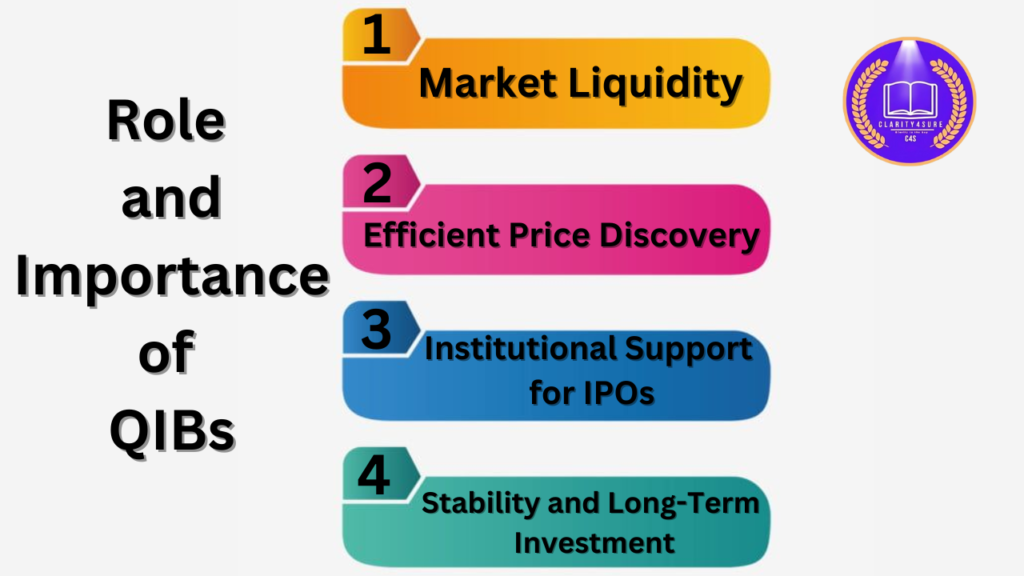
Introduction
Qualified Institutional Buyers (QIBs) play a crucial role in the financial markets by participating in large-scale investments and influencing market trends. They are institutional investors recognized for their financial expertise and substantial investment capacity. Regulatory bodies, such as the Securities and Exchange Board of India (SEBI) and the U.S. Securities and Exchange Commission (SEC), define and oversee QIBs to ensure market stability and investor protection.
Who Are Qualified Institutional Buyers (QIBs)?
QIBs are institutional investors that meet specific financial and regulatory criteria, allowing them to participate in securities offerings that are not available to the general public. They include:
- Mutual Funds:
- Large pools of capital invested in various securities to generate returns for investors.
- Banks:
- Financial institutions that manage significant funds and provide investment opportunities.
- Insurance Companies:
- Firms that invest large sums from policyholders in different financial instruments.
- Pension Funds:
- Organizations managing retirement savings and investing them in long-term securities.
- Foreign Institutional Investors (FIIs):
- Global investors participating in domestic markets under regulatory frameworks.
- Sovereign Wealth Funds (SWFs):
- State-owned funds investing in diversified asset classes.
- Alternative Investment Funds (AIFs):
- These include venture capital funds, private equity funds, and hedge funds regulated by SEBI.
Eligibility Criteria for QIBs
The criteria to qualify as a QIB vary across jurisdictions. Generally, institutions must:
- Have a minimum level of assets under management (AUM), typically in millions or billions.
- Demonstrate investment expertise and financial stability.
- Be registered with the relevant regulatory authorities.
| Region | Regulatory Body | Minimum AUM Requirement |
|---|---|---|
| U.S. | SEC (Rule 144A) | $100 million in securities |
| India | SEBI | Regulated financial entities (e.g., RBI, IRDAI) |
| EU | ESMA | Varies by country, but institutional grade |
Role and Importance of QIBs

QIBs play a significant role in financial markets due to their expertise and investment capacity. Their contributions include:
- Market Liquidity:
- Large-scale investments by QIBs enhance market liquidity, facilitating smoother trading.
- Efficient Price Discovery:
- Their involvement in securities trading ensures accurate pricing based on fundamental analysis.
- Institutional Support for IPOs:
- QIBs often invest in Initial Public Offerings (IPOs), providing companies with necessary capital for growth.
- Stability and Long-Term Investment:
- Their long-term investment horizon helps stabilize markets during volatility.
SEBI’s Role in Regulating QIBs
The Securities and Exchange Board of India (SEBI) plays a crucial role in regulating and overseeing QIBs. SEBI ensures that institutional investors adhere to market norms and protect retail investors’ interests. Some key SEBI regulations concerning QIBs include:
- Allocation in IPOs:
- SEBI mandates that at least 50% of shares in an IPO must be allocated to QIBs, ensuring strong institutional backing.
- Qualified Institutional Placement (QIP):
- A mechanism introduced by SEBI allowing listed companies to raise capital by selling securities exclusively to QIBs.
- Disclosure and Compliance Requirements:
- QIBs must follow strict disclosure norms to ensure transparency and prevent market manipulation.
- Investment in Debt Securities:
- SEBI allows QIBs to participate in corporate bond markets, helping companies raise funds efficiently.
- Monitoring Foreign Institutional Investors (FIIs):
- SEBI ensures FIIs investing in Indian markets adhere to investment caps and regulatory guidelines.
QIBs in Initial Public Offerings (IPOs)
Many regulatory frameworks reserve a portion of IPOs exclusively for QIBs. In India, SEBI mandates that at least 50% of shares in IPOs be allocated to QIBs to ensure credible investors support new market entrants. Their participation enhances investor confidence and promotes robust demand for IPO shares. Additionally:
- Anchor Investors:
- QIBs can act as anchor investors, committing to buying shares before an IPO opens to the public, providing assurance to other investors.
- Lock-in Period:
- SEBI enforces a lock-in period for anchor investors, ensuring market stability post-IPO.
Qualified Institutional Placement (QIP)
QIP is a capital-raising tool regulated by SEBI that allows listed companies to issue securities to QIBs without undergoing lengthy regulatory processes. Key benefits of QIP include:
- Faster Fundraising:
- Companies can raise capital quickly compared to traditional public offerings.
- Lower Regulatory Burden:
- QIBs are sophisticated investors, reducing the need for extensive disclosures.
- Market Confidence:
- QIP investments signal strong institutional backing, boosting stock prices.
Benefits and Risks of QIB Investments
Benefits
- Access to Exclusive Investment Opportunities:
- QIBs can invest in private placements and securities unavailable to retail investors.
- Better Bargaining Power:
- Due to their financial strength, QIBs can negotiate favorable investment terms.
- Diversification:
- Large institutions invest across sectors and geographies, reducing risk.
- Participation in Debt Markets:
- QIBs play a crucial role in corporate bond markets, providing necessary liquidity.
Risks
- Market Volatility:
- Large investments in a single asset class can be affected by market downturns.
- Regulatory Scrutiny:
- QIBs must comply with stringent regulations, which can impact investment strategies.
- Liquidity Risks:
- Investments in private placements or restricted securities may not be easily tradable.
- Impact of Global Economic Conditions:
- As major investors in various markets, QIBs can be affected by global financial crises.
Conclusion
Qualified Institutional Buyers (QIBs) are pivotal in global financial markets, driving liquidity, stability, and investment growth. By participating in IPOs, private placements, and large-scale securities transactions, they contribute significantly to the capital markets’ efficiency. SEBI’s role in regulating QIBs ensures market integrity and investor protection.
As financial markets evolve, QIBs will continue to play a vital role in shaping investment trends and fostering economic growth worldwide. Their influence, combined with regulatory oversight, ensures a well-balanced investment ecosystem that benefits both institutional and retail investors.
















